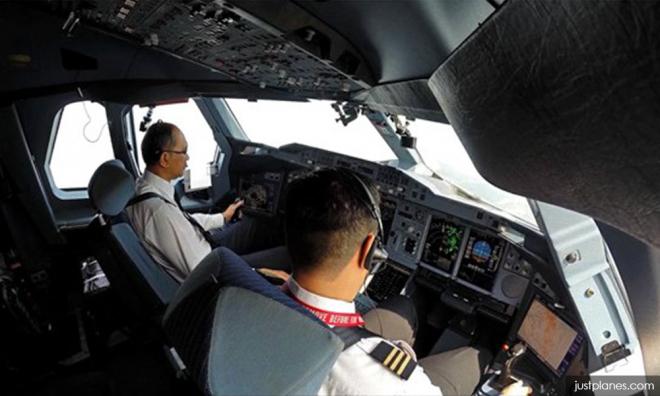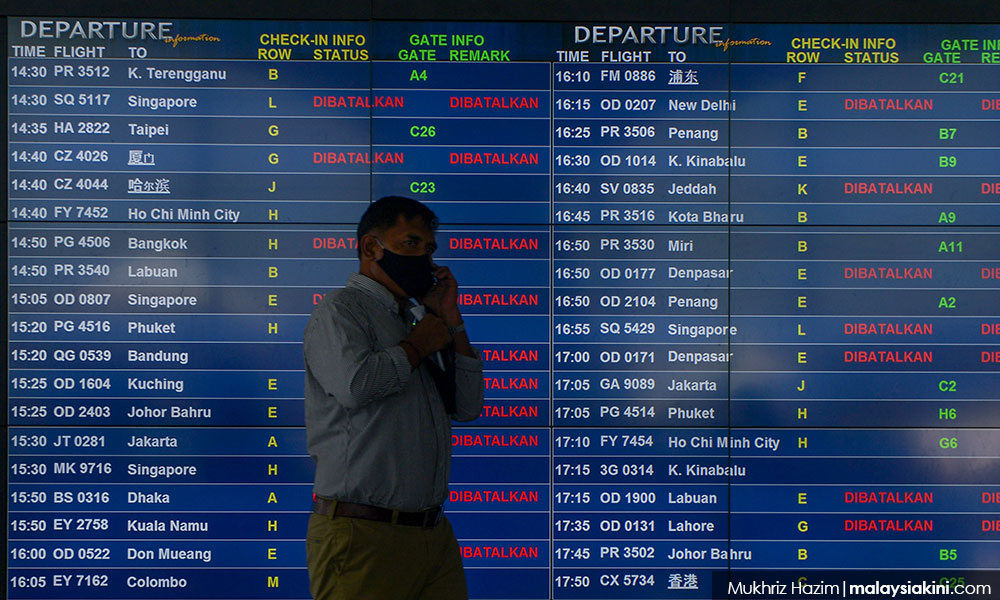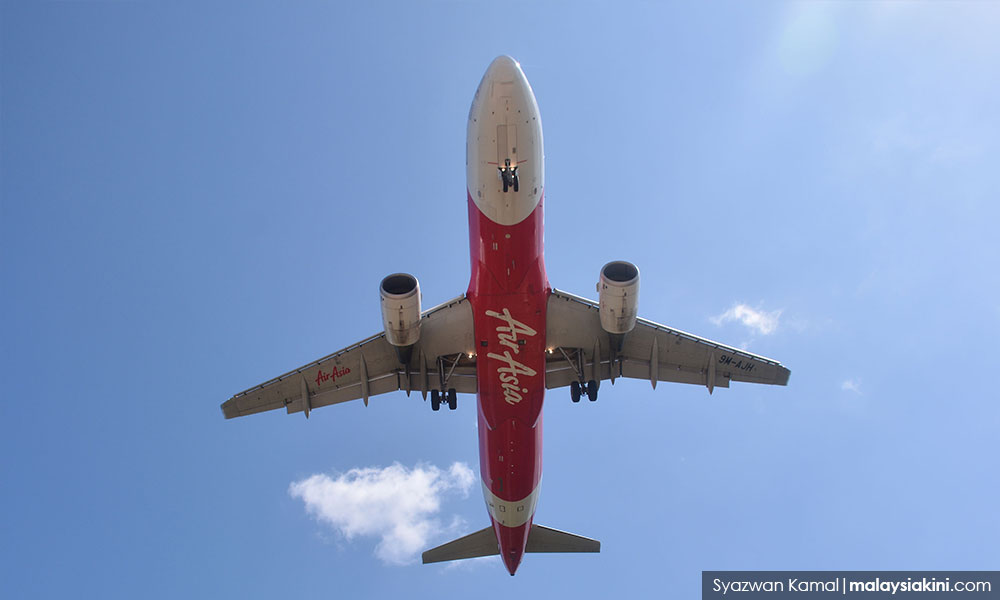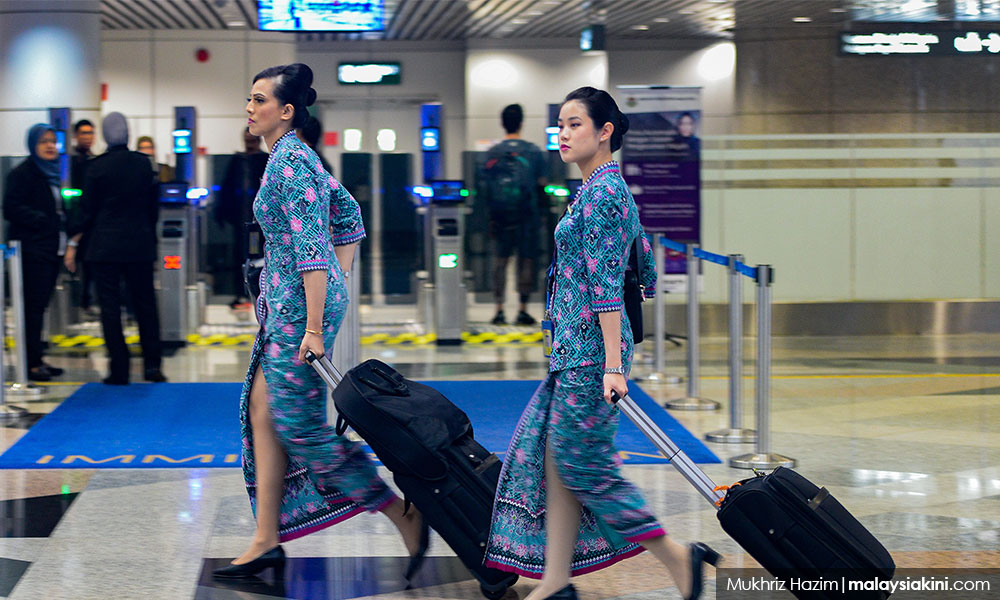
CORONAVIRUS | One of the industries most impacted by the Covid-19 pandemic is the airline industry. While air travel for business and pleasure has long been a norm, airlines around the world have taken a severe hit.
Indeed, globally the number of people flying in the first week of April was 10 million, less than one-quarter of international airline seats sold (44.2 million) in the first week of April 2019, according to travel industry analysts ForwardKeys.
This dramatic drop has translated into reduced flight routes and staff, with job cuts, slashed pay, unpaid leave and withdrawn job offers all common.
A Malaysian pilot based in Sydney, Australia working for a foreign airline found himself suddenly stranded when asked to go on unpaid leave. He still has his contract but is not working and living off savings, with no idea when the tide will turn.
And he is one of many.
Job offer withdrawn
Chan (not his real name) had been a captain flying in Taiwan when his contract ended and he decided to relocate to Malaysia.
He was offered a job by Malindo Airlines in early March and was looking forward to it. But this was just two weeks before the movement control order (MCO) was announced on March 17.
"I received an email stating my recruitment will be postponed until further notice,” said Chan who has been flying for more than 10 years.
He told Malaysiakini it is his first time being caught in this sort of situation. The pilot profession is considered lucrative and stable.
"It's usually considered a safe job in terms of retrenchment unless you join a smaller airline that runs into cash flow problems," he said.
For the short term, Chan is waiting it out and using his savings to cope with monthly expenses of approximately RM5,000.
"Generally in the industry, we are feeling a bit worried. We realise that we may not return to 'normal' very soon and the situation could remain like this for up to one or two years at least.
"Most pilots have been flying since young and have no experience in other jobs," he said.
Chan himself was accepted into a MAS cadet training programme at the age of 18 and does not hold a degree.
"So in the short term, we may have to become some sort of agent. An agent in property or in business is an option.
"If you don't fly for more than six months, and especially after one year, the airlines will not be so keen to take you back, and even then you will need some retraining modules. Of course, we hope that the industry will understand that what has happened this year is a special case."
Chan added that many expatriate pilots in China had suddenly found themselves jobless or with unpaid salaries and were sent back home.
Could take years to recover
Data firm OAG believes that several years of industry growth had been lost and it could take until 2022 or 2023 before the volume of fliers returns to the levels that had been expected for the year.

Cirium, another aviation data provider, said about half of the world’s airplane fleet was in storage.
According to a report released by the Department of Statistics on Friday (May 29) the aviation industry was significantly impacted due to the decline in demands among travellers, and flight cancellations as countries exercised border control actions.
"In mitigating this, the founders of AirAsia Group Berhad took the initiative to give up their salaries, while the staff has agreed to take pay cuts as the budget airline grapples to manage the impact of the coronavirus pandemic.
"Malindo Air resorted to ceasing all flights in April while its staff was asked to take no-pay leave," said the report, entitled the Malaysian Economic Statistics Review.
The same report said from the early indications in April and May, the economic environment is foreseen to be unfavourable for Malaysian businesses.
"To further support this, the latest Leading Indicator (LI) signals an economic recession for the next four to six months."
It also predicted a disruption in labour demand for fresh graduates entering the job market in the second half of this year.
More than 75pct flights affected, says AirAsiaX pilot
AirAsiaX pilot Hashim Hussein (not his real name) is another in the industry who has been affected.
“Virtually all long-haul flights have been suspended with the exception of cargo, humanitarian and repatriation flights. My airline currently has more than 75 percent of its fleet in long-term aviation parking,” he told Malaysiakini.
“We have not been 'grounded' per se. All the pilots are rostered as available for duty and we are informed a day in advance, at the very latest, should we be assigned a flight or standby duty."
Like Chan, Hashim pointed out that with such a drastic reduction, not all pilots can meet the technical requirements of the job.
“With the reduction of flights, naturally the number of flying duties available have greatly reduced. As a result, there are some pilots who are not able to maintain the same regulatory currency requirements that are set out by the Civil Aviation Authority of Malaysia, which is three takeoffs and three landings in a 90-day period.
“Thus, they are no longer qualified to operate as flight crew without having to undergo training in the simulator beforehand," he said.
The airline has elected to not requalify these crew members as there will be an additional cost (approximately RM7,000 an hour for the simulator) to the airline. Due to the reduction of flights, the current manpower is sufficient to maintain operations.
Hashim said that while pilots are receiving a full basic salary, their earnings are based on productivity and most of that has been slashed.
“Our productivity allowances, which makes up the bulk of our monthly earnings, have been cut.
"The top earners of my airline have elected to a pay cut to hold off from cutting salaries of the company’s lower earners who will be more adversely affected should their income be reduced. Salary increments and bonus payments have also been suspended indefinitely,” he said.
Hashim said his employers are optimistic about restarting operations closer to September or October but the situation remains very fluid as things are constantly changing.

“Convincing the public that it is safe to fly will prove challenging unless there is an effective treatment for Covid-19 through a cure or vaccine.”
He cited the International Air Transport Association (IATA) as saying that the risk of transmission between passengers onboard is low, possibly due to the lack of face-to-face contact and the design of the cabin air system.
The aircraft cabin is equipped with high-efficiency particulate air (Hepa) filters to filter around 99.97 percent of airborne viruses to ensure that passengers are breathing clean air.
“In the long term, I am certain that the airline industry will survive as air travel/freight has become an essential part of our world. But with the prolonged travel restrictions, we will, unfortunately, see a few airlines cease to exist.
“This can have a negative impact on customers, as surviving airlines may raise the price of flight tickets to make up for the loss of revenue and the lack of competition will give travellers fewer airline options to choose from," predicted Hashim.
He pointed out that international travel is further impacted in comparison to domestic travel.
“This is due to foreign government policies that dictate whether they allow visitors into their country. For example, Australia has closed its borders to all except for citizens and permanent residents, and those returning are subject to strict quarantine rules.
"As such, the tedious process of going through quarantine at your destination and upon returning has severely affected travel demand."
Hashim called for more support for the aviation industry from the government.
“Soft loans will help airlines weather these challenging times whilst maintaining a majority of jobs. Most, if not all, pilots did not qualify for Bantuan Prihatin Nasional (BPN), but assistance such as the loan moratorium from Bank Negara is helpful.”
'Staff at all levels are affected'
National Union of Flight Attendants Malaysia (Nufam) president Ismail Nasaruddin told Malaysiakini that times have never been this bad.

“Looking at our members, I would say the impact is huge. In my 26 years in the industry, this is by far the biggest challenge we have faced,” he said.
“Based on our feedback from our members I would say 90 percent of flights were grounded in April, some airlines were operating just a couple of flights a week."
He said that the industry was already contracting prior to the Covid-19 crisis and that Nufam currently represents over 1,000 members, but actually lost 3,000-4,000 in the last few years from retrenchment.
“Right now we have seen airlines take the drastic step of asking staff to take a 30 percent to 50 percent pay cut or three months unpaid leave - until June or until things subside.
"Aviation organisations all around the world are affected including American Airlines, and we have seen sales involving Royal Thai Airway and so there is definitely uncertainty in the industry.
"There is talk that worldwide there could be more than 20 airlines closing or making drastic cuts,” said Ismail.
Despite attempts to help employees by some airline companies, he said many have had no choice but to do side businesses to survive.
“Driving Grab, setting up Ramadan stalls, doing online businesses from home, our members have no choice,” he said.
He added that Nufam was offering assistance to members on the BPN applications as most were rejected.
Airlines tight-lipped about future
When contacted on future plans and projections, AirAsia was tight-lipped about its future, choosing to highlight its new contactless procedures for essential travel including contactless payments at the airport, contactless kiosks, the Passenger Reconciliation System (PRS) as well as enhanced features on its mobile app.
It said the PRS will be available at KLIA2, followed soon by other airports in Malaysia where AirAsia operates.
“The PRS entails no boarding pass exchange between guests and Avsec (aviation security) as guests only need to scan them instead. Furthermore, AirAsia has also digitised the boarding process by scanning all boarding passes at the boarding gate instead of collecting stubs of physical ones," it said.
The airline has also been flying with new onboard safety measures to minimise the risks concerned with Covid-19.
AirAsia Group Chief Operations Officer Javed Malik said in a statement: “In addition to the existing strict safety measures on-ground, such as social distancing markers and Allstars wearing personal protective equipment, we are pleased to introduce our updated contactless procedures to deliver a more secure, safe, efficient, and contactless experience for our guests across the region.
"Safety is our utmost priority and these additional enhancements demonstrate our continued commitment to keeping flying safe in the new normal environment for air travel.” - Mkini



No comments:
Post a Comment
Note: Only a member of this blog may post a comment.